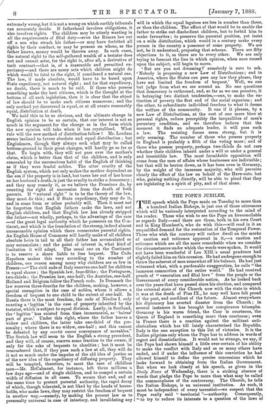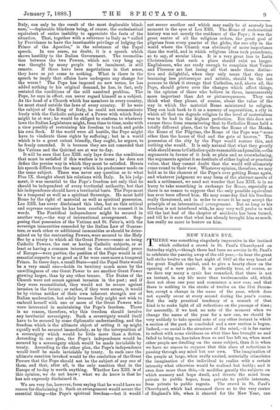THE POPE'S JUBILEE. T HE speech which the Pope made on
Tuesday to more than a hundred Italian Bishops, is just one of those utterances which will be variously interpreted according to the mind of the reader. Those who wish to see the Pope an Irreconcilable as regards Italy—and there are those, both in his own Court and in King Humbert's, who do wish this—will read in it an unqualified demand for the restoration of the Temporal Power. Those who wish the contrary will rather dwell on the marks of caution and reticence apparent in it,—a caution and reticence which are all the more remarkable when we consider the circumstances under which the words were spoken. It would not have been wonderful if Leo RITT 's usual prudence had slightly failed him on this occasion. He had undergone enough to throw the soberest of men somewhat off his balance. He had just witnessed what, with a pardonable exaggeration, he calls "the immense commotion of the entire world." He had received proofs of "veneration and filial love" from the people or the Government of every considerable nation. As he looked back over the years that have passed since his election, and compared the external state of the Church now with the state in which it was at the death of Pius IX., he may well have felt proud of the past, and confident of the future. Almost everywhere his diplomacy has averted disaster from the Church ; in several instances it has brought her conspicuous triumphs. Germany is his warm friend, the Czar is courteous, the Queen of England is something more than courteous ; even in France there is a reaction against the militant anti- clericalism which has till lately characterised the Republic. Italy is the one exception to this list of victories. It is the Italian pilgrims only whom the Pope has to address in words of regret and dissatisfaction. It would not be strange, we say, if the Pope had shown himself a little over-certain of his ability to make the conflict with Italy end as so many others have ended, and if under the influence of this conviction he had allowed himself to define the precise concessions which he looks forward to obtaining from the Italian Government. But when we look closely at his speech, as given in the Daily News of Wednesday, there is a striking absence of words that pledge the Pope to more than what may be called the commonplaces of the controversy. The Church, he tells the Italian Bishops, is an universal institution. As such, it must be independent of every terrestial—we suspect that the Pope really said territorial "—authority. Consequently, "to try to reduce its interests to a question of the laws of Italy, can only be the result of the most deplorable blind- ness,"—deplorable blindness being, of course, the ecclesiastical equivalent of entire inability to appreciate the facts of the situation. That, together with a reference to Italy as "called by Providence to have the inestimable privilege of lodging the Prince of the Apostles," is the substance of the Papal speech. In one sense, no doubt, it is a speech which shows hostility to the Italian Government. The reconcilia- tion between the two Powers, which not very long ago was thought by many people to be imminent, is still
remote. If there have been negotiations in that sense, they have as yet come to nothing. What is there in the speech to imply that affairs have undergone any change for the worse ? The Pope has imposed no new terms, he has added nothing to his original demand, he has, in fact, only restated the conditions of the still unsolved problem. The Pope, he says in effect, can never regard himself as a subject. As the head of a Church which has members in every country, he must stand outside the laws of every country. If he were the subject of the King of Italy, he could not communicate freely with the Catholic subjects of a Power with which Italy might be at war ; he would be obliged to conform to whatever laws the Italian Legislature might, from time to time, make with a view possibly of restraining his freedom to teach and guide his own flock. If the world were all hostile, the Pope might have to vindicate these rights by suffering ; but in a world which is to a great extent friendly, they ought, he argues, to be freely conceded. It is because they are not conceded that the Vatican and the Quirinal are at war to-day.
It will be seen that Leo XIII. only lays down the conditions that must be satisfied if this warfare is to cease ; he does not define the precise way in which they must be satisfied. Herein his speech differs from the many which his predecessor made on the same subject. There was never any question as to what Pius 1X. thought about his relations with Italy. In his judg- ment, it was essential to the Pope's freedom not only that he should be independent of every territorial authority, but that his independence should have a territorial basis. The Pope must be a temporal as well as a spiritual Sovereign. He must hold Rome by the right of material as well as spiritual possession. Leo XIII. has never disclaimed this idea, but on this critical and supreme occasion he has been careful not to reassert it in words. The Pontifical independence might be secured in another way,—the way of international arrangement. Sup- posing that possession of the Vatican and St. Peter's, with the sovereign immunities conceded by the Italian Law of Guaran- tees, or such other or additional immunities as should be deter- mined on by the contracting Powers, were secured to the Holy See by a treaty to which all the Great Powers—some as being Catholic Powers, the rest as having Catholic subjects, or at least as having a common interest in the ecclesiastical peace of Europe—were parties, the position of the Pope would in all essential respects be as good as if he were once more a temporal Prince. In these days, a small State—and the Papal State would be a very small one—holds its territory much more by the unwillingness of one Great Power to see another Great Power growing larger, than by any other tenure. The States of the Church were not secure against invasion in the past ; and if they were reconstituted, they would not be secure against invasion in the future ; or rather, if they were secure, it would be by virtue neither of their own inherent strength nor of Italian moderation, but solely because Italy might not wish to embroil herself with one or more of the Great Powers who were interested in maintaining the Pope's freedom. There is no reason, therefore, why this freedom should involve any territorial sovereignty. Such a sovereignty would itself have to be secured by some diplomatic understanding, and the freedom which is the ultimate object of setting it up might equally well be secured immediately, as by the interposition of a sovereignty which would be little more than a fiction. According to one plan, the Pope's independence would be secured by a sovereignty which would be made inviolable by treaty. According to the other plan, the Pope's independence would itself be made inviolable by treaty. In each case the ultimate sanction invoked would be the resolution of the Great Powers that the Pope should not be the subject of any one of them, and that, after all, is the only sanction that in the
Europe of to-day is worth anything. Whether Leo XIII. is of this opinion, we do not know ; what we do know is that he has not expressly disclaimed it.
We are very far, however, from saying that he would have no reason for disclaiming it. Such an arrangement would secure the essential thing—the Pope's spiritual freedom—but it would
not secure another end which may easily be of scarcely less moment in the eyes of Leo XIII. The Rome of ecclesiastical history was not merely the residence of the Pope ; it was the great centre of all the religious orders, the great goal of pilgrims from every quarter of the globe, the one city in the world where the Church was obviously of more importance than the world, and in which religions ideas took precedence, so to say, of secular ideas. It is a very great loss to Latin Christendom that such a place should exist no longer. Englishmen, who are ready enough to complain that Venice and Florence are fast losing all that made them distinc- tive and delightful, when they only mean that they are becoming less picturesque and artistic, should be the last persons to think it strange that Catholics, and, above all, the Pope, should grieve over the changes which affect things, in the opinion of those who believe in them, immeasurably more important than Art or picturesqueness. They can think what they please, of course, about the value of the way in which the material Rome ministered to religion. They can look back to it as a nursery of superstition, a city in which all that can degrade religion to the level of materialism was to be had in the highest perfection. But this does not excuse them from remembering that to Catholics Rome held a- totally different place, that to them the Rome of the Monks, the Rome of the Pilgrims, the Rome of the Pope was "none other than the house of God and the gate of heaven." The possession of the city by the Pope would restore this, and. nothing else would. It is only natural that what they greatly wish should seem to Catholics quite reasonable and possible,—the arguments in favour of it look so plain and so overwhelming, the arguments against it so destitute of either logical or practical value, that they cannot doubt that the world will ultimately come round to their view. Whatever opinion, therefore, we may hold as to the chances of the Pope's ever getting Rome again, and whatever judgment we may form of the abstract merits of such a settlement, we need not wonder that Leo XIII. is in no hurry to take something in exchange for Rome, especially as there is no reason to suppose that the only possible equivalent has ever been offered him. He may some day find his freedom really threatened, and in order to secure it he may accept the principle of an international arrangement. But so long as his freedom is not interfered with, he may very well prefer to wait till the last leaf of the chapter of accidents has been turned, and till he is sure that what has already brought him so much, has really no more to bestow on him.























































 Previous page
Previous page